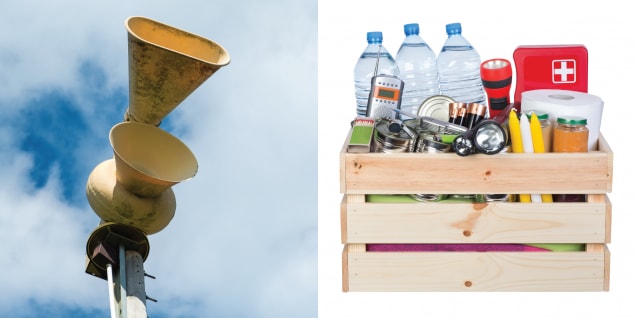Disaster Planning: People with Chronic Disease
Natural disasters, such as hurricanes, floods, tornados and wildfires, can be stressful and devastating for persons living with a chronic disease. Learn tips to help reduce the risk of illness or serious health complications in a disaster.

Be prepared for a disaster. Make an emergency plan and kit.
- Make an emergency plan and kit. Maintain at least a three-day supply of water, food, and medicine. Consider signing up for SMART911, Code Red, or your local county registry. These services help first responders identify people who may need assistance in a disaster.
- If you -need to leave your home, know where to go (e.g., family members house, shelter) and be prepared to leave quickly. Have medicines, medical records, insurance information, and healthcare provider’s information, with you.
- Ask your doctor for an extra supply of prescribed medicines, and have a list of all prescription medicines (including name, dose, and pharmacy information). If staying in a shelter or temporary housing, tell the staff about your health problems, special needs and any medicines you are taking.
- Keep medicines, supplies, and equipment out of the heat and in a safe and waterproof location. If you use medical equipment that works with electricity, learn How to Prepare and Handle Power Outages [PDF – 5KB].
- Check if the Emergency Prescription Assistance Program (EPAP) is activated after a disaster. This free service helps residents get medicine, medical supplies, medical equipment and vaccines that were lost, stolen, or damaged due to the disaster. Call 855-793-7470 to enroll or visit the EPAP website. Check RX Open to find open pharmacies.
- Take steps to avoid getting an infection or illness. Clean up, disinfect, and wash your hands often, and stay away from moldy or dirty places. If you do not have soap and clean water, use an alcohol-based hand sanitizer. Seek immediate medical care if a wound develops redness or swelling, or if you have other signs of infection, such as fever, increasing pain, shortness of breath, confusion, disorientation or high heart rate.
- During or after a natural disaster, it may be hard to find the food that you usually eat, particularly if you are on a special diet. Try to eat as healthy as possible by choosing foods that are lower in added sugars and salt.
- If you feel overwhelmed, reach out to family, friends, support groups, or a healthcare professional for support. Engaging in physical activity can help you to reduce stress, manage your condition and cope with a natural disaster.





















.png)












No hay comentarios:
Publicar un comentario